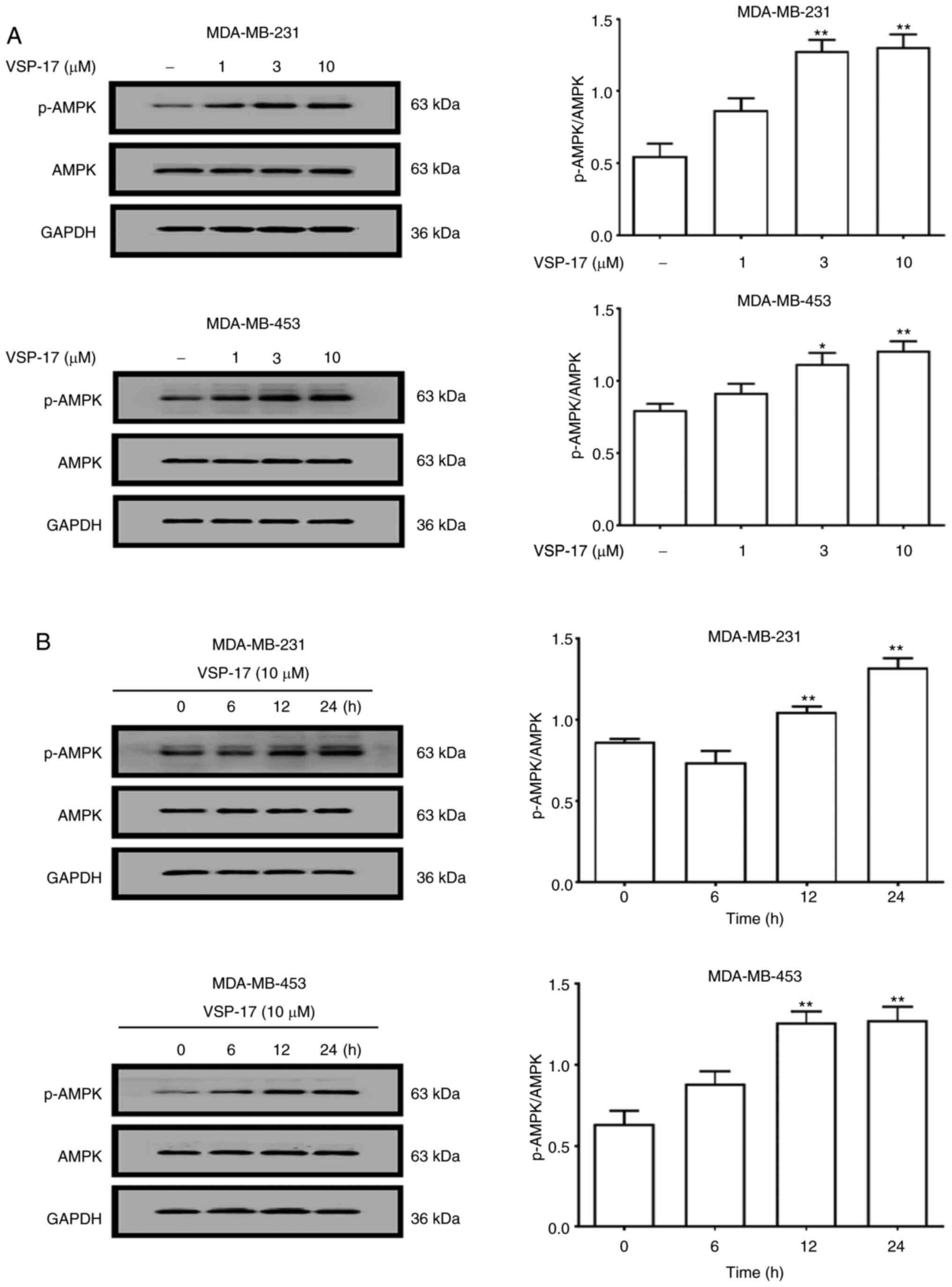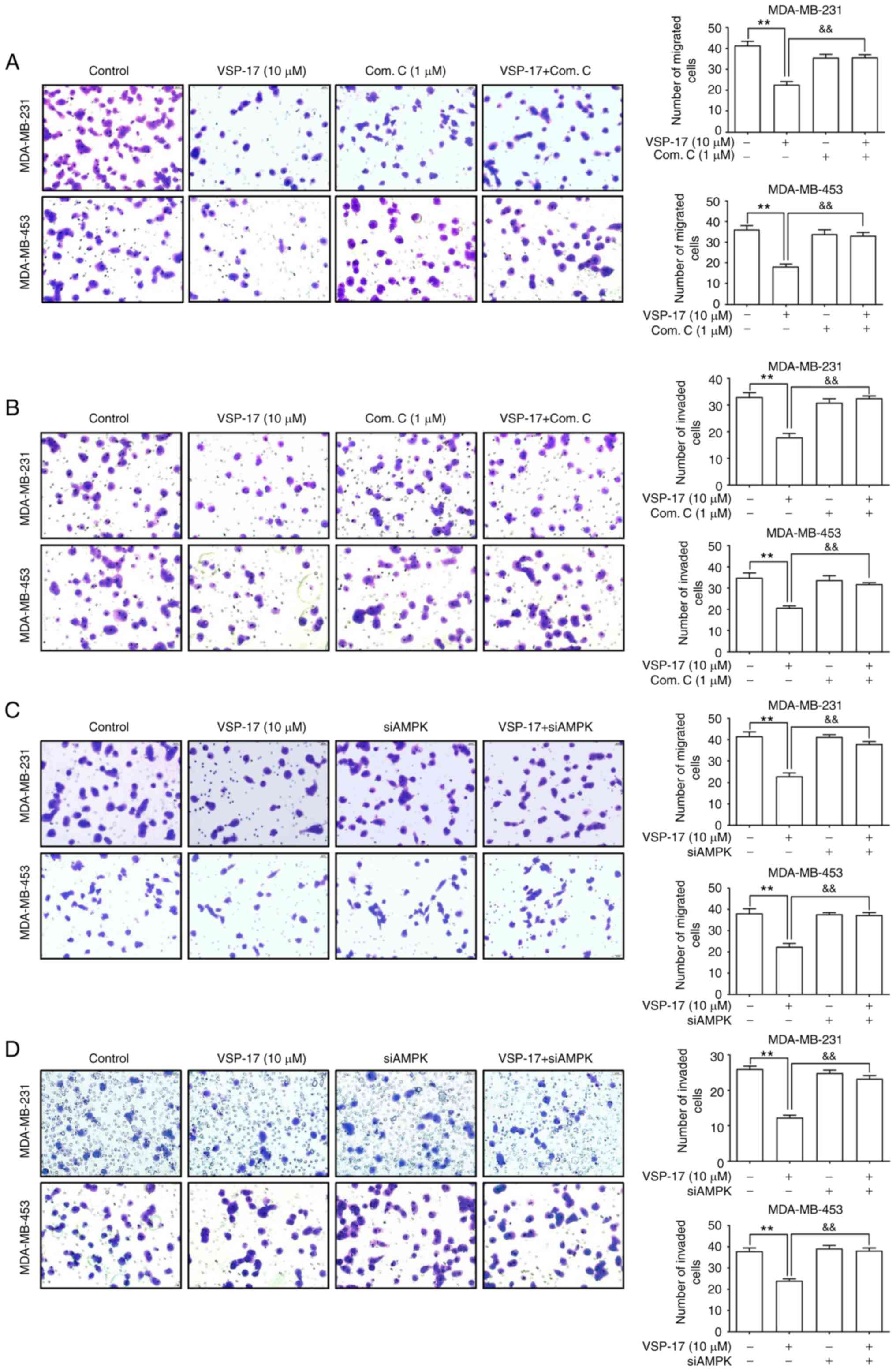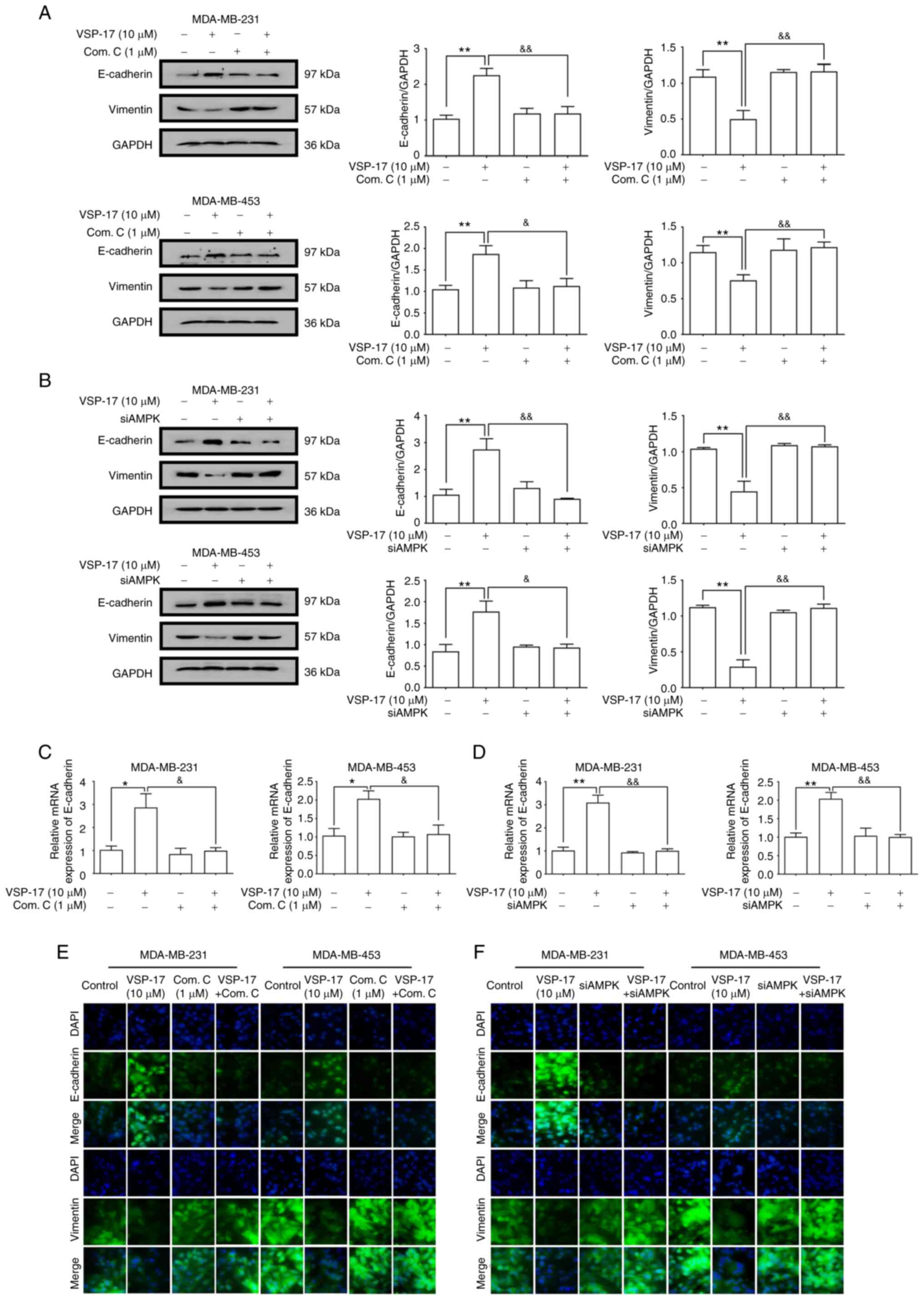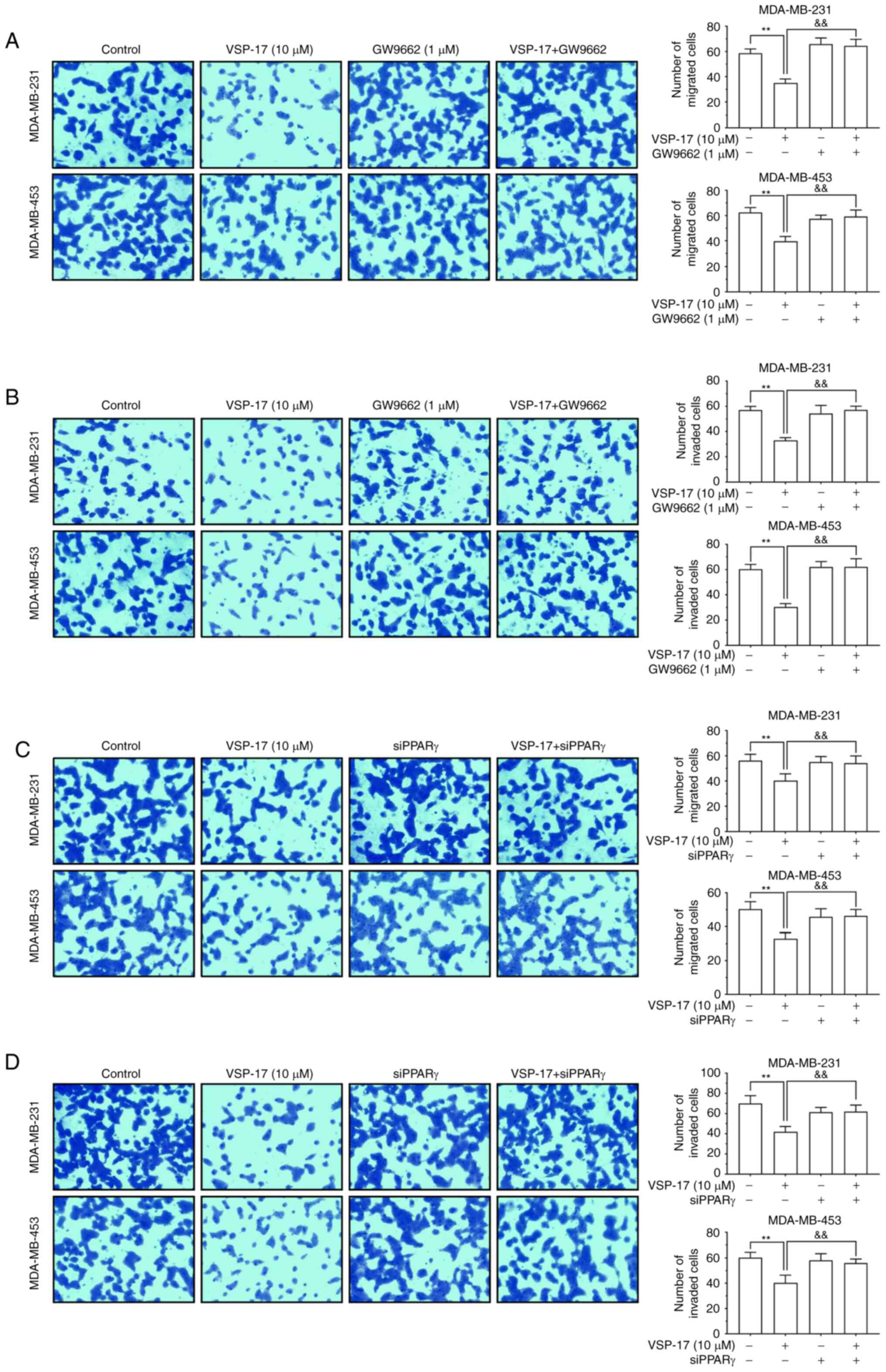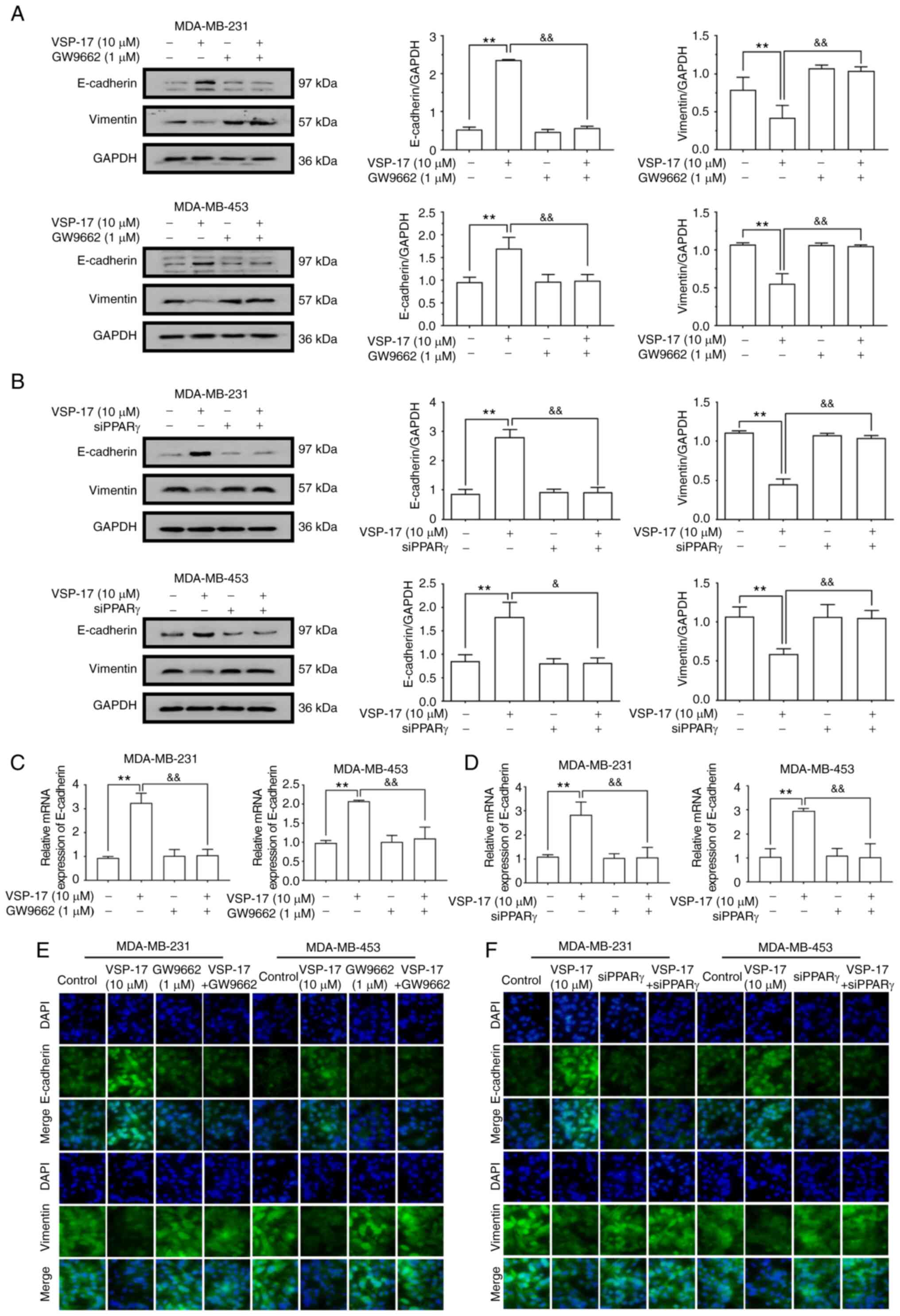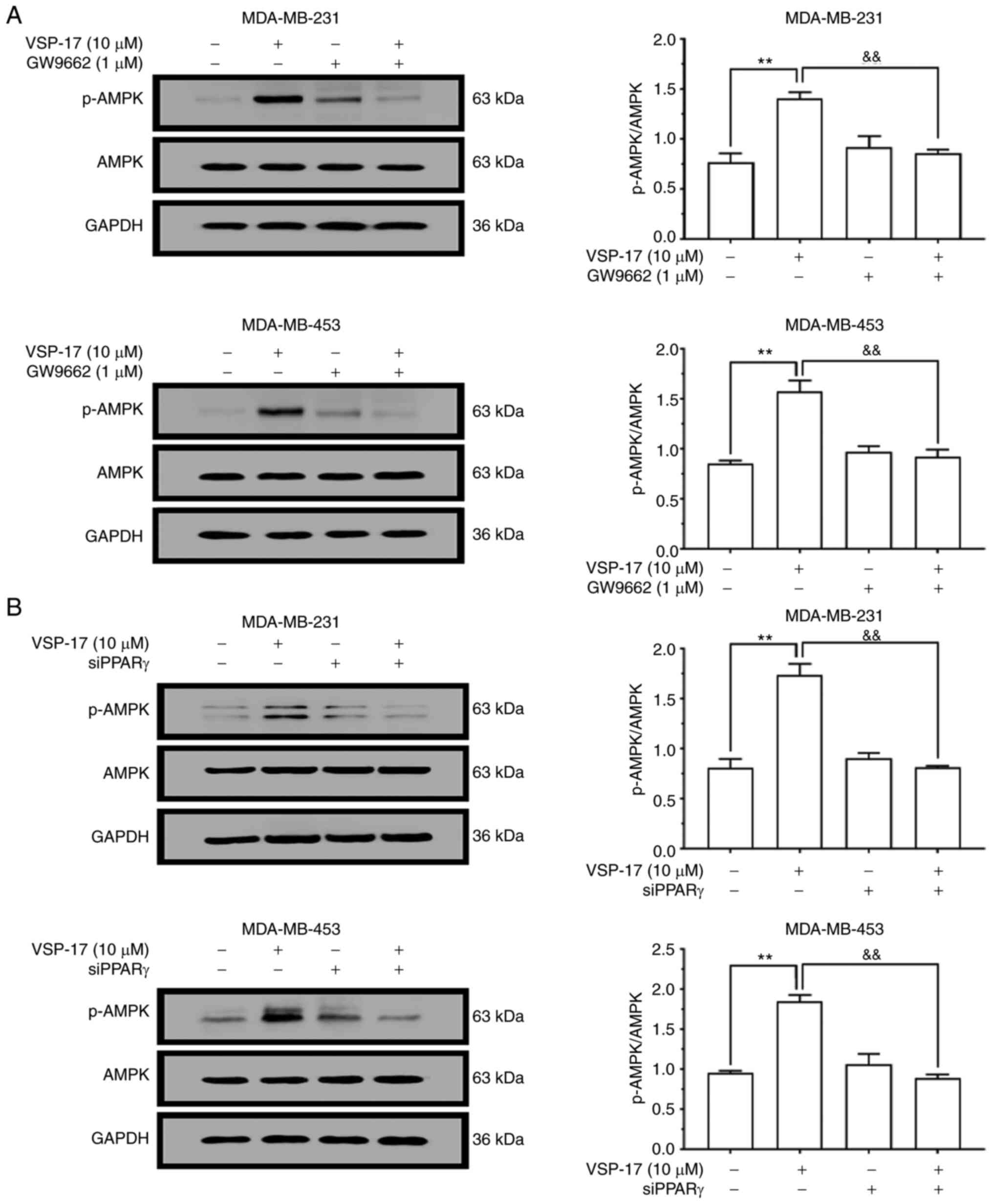|
1
|
da Silva JL, Cardoso Nunes NC, Izetti P,
de Mesquita GG and de Melo AC: Triple negative breast cancer: A
thorough review of biomarkers. Crit Rev Oncol Hematol.
145:1028552020. View Article : Google Scholar : PubMed/NCBI
|
|
2
|
Bianchini G, Balko JM, Mayer IA, Sanders
ME and Gianni L: Triple-negative breast cancer: Challenges and
opportunities of a heterogeneous disease. Nat Rev Clin Oncol.
13:674–690. 2016. View Article : Google Scholar : PubMed/NCBI
|
|
3
|
He Z, Xu Q, Wang X, Wang J, Mu X, Cai Y,
Qian Y, Shao W and Shao Z: RPLP1 promotes tumor metastasis and is
associated with a poor prognosis in triple-negative breast cancer
patients. Cancer Cell Int. 18:1702018. View Article : Google Scholar : PubMed/NCBI
|
|
4
|
Braicu C, Chiorean R, Irimie A, Chira S,
Tomuleasa C, Neagoe E, Paradiso A, Achimas-Cadariu P, Lazar V and
Berindan-Neagoe I: Novel insight into triple-negative breast
cancers, the emerging role of angiogenesis, and antiangiogenic
therapy. Expert Rev Mol Med. 18:e182016. View Article : Google Scholar : PubMed/NCBI
|
|
5
|
Koedoot E, Fokkelman M, Rogkoti VM, Smid
M, van de Sandt I, de Bont H, Pont C, Klip JE, Wink S, Timmermans
MA, et al: Uncovering the signaling landscape controlling breast
cancer cell migration identifies novel metastasis driver genes. Nat
Commun. 10:29832019. View Article : Google Scholar : PubMed/NCBI
|
|
6
|
Zhang W, Xia D, Li Z, Zhou T, Chen T, Wu
Z, Zhou W, Li Z, Li L and Xu J: Aurora-A/ERK1/2/mTOR axis promotes
tumor progression in triple-negative breast cancer and
dual-targeting Aurora-A/mTOR shows synthetic lethality. Cell Death
Dis. 10:6062019. View Article : Google Scholar : PubMed/NCBI
|
|
7
|
Kabil N, Bayraktar R, Kahraman N, Mokhlis
HA, Calin GA, Lopez-Berestein G and Ozpolat B: Thymoquinone
inhibits cell proliferation, migration, and invasion by regulating
the elongation factor 2 kinase (eEF-2K) signaling axis in
triple-negative breast cancer. Breast Cancer Res Treat.
171:593–605. 2018. View Article : Google Scholar : PubMed/NCBI
|
|
8
|
Cao D, Zhu GY, Lu Y, Yang A, Chen D, Huang
HJ, Peng SX, Chen LW and Li YW: Luteolin suppresses
epithelial-mesenchymal transition and migration of triple-negative
breast cancer cells by inhibiting YAP/TAZ activity. Biomed
Pharmacother. 129:1104622020. View Article : Google Scholar : PubMed/NCBI
|
|
9
|
Yeung KT and Yang J:
Epithelial-mesenchymal transition in tumor metastasis. Mol Oncol.
11:28–39. 2017. View Article : Google Scholar : PubMed/NCBI
|
|
10
|
Savagner P: Leaving the neighborhood:
Molecular mechanisms involved during epithelial-mesenchymal
transition. Bioessays. 23:912–923. 2001. View Article : Google Scholar : PubMed/NCBI
|
|
11
|
Heimes AS and Schmidt M: Atezolizumab for
the treatment of triple-negative breast cancer. Expert Opin
Investig Drugs. 28:1–5. 2019. View Article : Google Scholar : PubMed/NCBI
|
|
12
|
Lamouille S, Xu J and Derynck R: Molecular
mechanisms of epithelial-mesenchymal transition. Nat Rev Mol Cell
Biol. 15:178–196. 2014. View
Article : Google Scholar : PubMed/NCBI
|
|
13
|
Liu J, Song N, Huang Y and Chen Y: Irisin
inhibits pancreatic cancer cell growth via the AMPK-mTOR pathway.
Sci Rep. 8:152472018. View Article : Google Scholar : PubMed/NCBI
|
|
14
|
Luo W, Liu Q, Jiang N, Li M and Shi L:
Isorhamnetin inhibited migration and invasion via suppression of
Akt/ERK-mediated epithelial-to-mesenchymal transition (EMT) in A549
human non-small-cell lung cancer cells. Biosci Rep.
39:BSR201901592019. View Article : Google Scholar : PubMed/NCBI
|
|
15
|
Eroles P, Bosch A, Pérez-Fidalgo JA and
Lluch A: Molecular biology in breast cancer: Intrinsic subtypes and
signaling pathways. Cancer Treat Rev. 38:698–707. 2012. View Article : Google Scholar : PubMed/NCBI
|
|
16
|
Green AS, Chapuis N, Lacombe C, Mayeux P,
Bouscary D and Tamburini J: LKB1/AMPK/mTOR signaling pathway in
hematological malignancies: From metabolism to cancer cell biology.
Cell Cycle. 10:2115–2120. 2011. View Article : Google Scholar : PubMed/NCBI
|
|
17
|
He K, Guo X, Liu Y, Li J, Hu Y, Wang D and
Song J: TUFM downregulation induces epithelial-mesenchymal
transition and invasion in lung cancer cells via a mechanism
involving AMPK-GSK3β signaling. Cell Mol Life Sci. 73:2105–2121.
2016. View Article : Google Scholar : PubMed/NCBI
|
|
18
|
Shaw RJ, Kosmatka M, Bardeesy N, Hurley
RL, Witters LA, DePinho RA and Cantley LC: The tumor suppressor
LKB1 kinase directly activates AMP-activated kinase and regulates
apoptosis in response to energy stress. Proc Natl Acad Sci USA.
101:3329–3335. 2004. View Article : Google Scholar : PubMed/NCBI
|
|
19
|
Khan S, Shukla S, Sinha S and Meeran SM:
Role of adipokines and cytokines in obesity-associated breast
cancer: Therapeutic targets. Cytokine Growth Factor Rev.
24:503–513. 2013. View Article : Google Scholar : PubMed/NCBI
|
|
20
|
Si Y, Wang J, Liu X, Zhou T, Xiang Y,
Zhang T, Wang X, Feng T, Xu L, Yu Q, et al: Ethoxysanguinarine, a
novel direct activator of AMP-activated protein kinase, induces
autophagy and exhibits therapeutic potential in breast cancer
cells. Front Pharmacol. 10:15032020. View Article : Google Scholar : PubMed/NCBI
|
|
21
|
Baba Y, Nosho K, Shima K, Meyerhardt JA,
Chan AT, Engelman JA, Cantley LC, Loda M, Giovannucci E, Fuchs CS
and Ogino S: Prognostic significance of AMP-activated protein
kinase expression and modifying effect of MAPK3/1 in colorectal
cancer. Br J Cancer. 103:1025–1033. 2010. View Article : Google Scholar : PubMed/NCBI
|
|
22
|
Cazarin JM, Coelho RG, Hecht F, Andrade BM
and Carvalho DP: 5′-AMP-activated protein kinase regulates
papillary (TPC-1 and BCPAP) thyroid cancer cell survival,
migration, invasion, and epithelial-to-mesenchymal transition.
Thyroid. 26:933–942. 2016. View Article : Google Scholar : PubMed/NCBI
|
|
23
|
Qu C, Zhang W, Zheng G, Zhang Z, Yin J and
He Z: Metformin reverses multidrug resistance and
epithelial-mesenchymal transition (EMT) via activating
AMP-activated protein kinase (AMPK) in human breast cancer cells.
Mol Cell Biochem. 386:63–71. 2014. View Article : Google Scholar : PubMed/NCBI
|
|
24
|
Han YH, Kee JY and Hong SH: Rosmarinic
acid activates AMPK to inhibit metastasis of colorectal cancer.
Front Pharmacol. 9:682018. View Article : Google Scholar : PubMed/NCBI
|
|
25
|
Lamers C, Schubert-Zsilavecz M and Merk D:
Therapeutic modulators of peroxisome proliferator-activated
receptors (PPAR): A patent review (2008-present). Expert Opin Ther
Pat. 22:803–841. 2012. View Article : Google Scholar : PubMed/NCBI
|
|
26
|
Krishnan A, Nair SA and Pillai MR: Biology
of PPAR gamma in cancer: A critical review on existing lacunae.
Curr Mol Med. 7:532–540. 2007. View Article : Google Scholar : PubMed/NCBI
|
|
27
|
Nunez-Anita RE, Cajero-Juarez M and Aceves
C: Peroxisome proliferator-activated receptors: Role of isoform
gamma in the antineoplastic effect of iodine in mammary cancer.
Curr Cancer Drug Targets. 11:775–786. 2011. View Article : Google Scholar : PubMed/NCBI
|
|
28
|
Wang Y, Zhu M, Yuan B, Zhang K, Zhong M,
Yi W, Xu X and Duan X: VSP-17, a New PPARγ agonist, suppresses the
metastasis of triple-negative breast cancer via upregulating the
expression of E-Cadherin. Molecules. 23:1212018. View Article : Google Scholar
|
|
29
|
Livak KJ and Schmittgen TD: Analysis of
relative gene expression data using real-time quantitative PCR and
the 2(-Delta Delta C(T)) method. Methods. 25:402–408. 2001.
View Article : Google Scholar : PubMed/NCBI
|
|
30
|
Jolly MK, Ware KE, Xu S, Gilja S, Shetler
S, Yang Y, Wang X, Austin RG, Runyambo D, Hish AJ, et al:
E-Cadherin represses anchorage-independent growth in sarcomas
through both signaling and mechanical mechanisms. Mol Cancer Res.
17:1391–1402. 2019. View Article : Google Scholar : PubMed/NCBI
|
|
31
|
Kang DY, Sp N, Kim DH, Joung YH, Lee HG,
Park YM and Yang YM: Salidroside inhibits migration, invasion and
angiogenesis of MDA-MB 231 TNBC cells by regulating EGFR/Jak2/STAT3
signaling via MMP2. Int J Oncol. 53:877–885. 2018.PubMed/NCBI
|
|
32
|
Chien YC, Liu LC, Ye HY, Wu JY and Yu YL:
EZH2 promotes migration and invasion of triple-negative breast
cancer cells via regulating TIMP2-MMP-2/-9 pathway. Am J Cancer
Res. 8:422–434. 2018.PubMed/NCBI
|
|
33
|
Zardavas D, Baselga J and Piccart M:
Emerging targeted agents in metastatic breast cancer. Nat Rev Clin
Oncol. 10:191–210. 2013. View Article : Google Scholar : PubMed/NCBI
|
|
34
|
Bojková B, Garajová M, Kajo K, Péc M,
Kubatka P, Kassayová M, Kisková T, Orendás P, Ahlersová E and
Ahlers I: Pioglitazone in chemically induced mammary carcinogenesis
in rats. Eur J Cancer Prev. 19:379–384. 2010. View Article : Google Scholar : PubMed/NCBI
|
|
35
|
Colmers IN, Bowker SL and Johnson JA:
Thiazolidinedione use and cancer incidence in type 2 diabetes: A
systematic review and meta-analysis. Diabetes Metab. 38:475–484.
2012. View Article : Google Scholar : PubMed/NCBI
|
|
36
|
Fogo AB: Potential for peroxisome
proliferator-activated receptor-gamma agonists in progression:
Beyond metabolism. Curr Opin Nephrol Hypertens. 17:282–285. 2008.
View Article : Google Scholar : PubMed/NCBI
|
|
37
|
Xu YY, Liu H, Su L, Xu N, Xu DH, Liu HY,
Spaner D, Bed-David Y and Li YJ: PPARγ inhibits breast cancer
progression by upregulating PTPRF expression. Eur Rev Med Pharmacol
Sci. 23:9965–9977. 2019.PubMed/NCBI
|
|
38
|
Burstein HJ, Demetri GD, Mueller E, Sarraf
P, Spiegelman BM and Winer EP: Use of the peroxisome
proliferator-activated receptor (PPAR) gamma ligand troglitazone as
treatment for refractory breast cancer: A phase II study. Breast
Cancer Res Treat. 79:391–397. 2003. View Article : Google Scholar : PubMed/NCBI
|
|
39
|
Spence JD, Viscoli CM, Inzucchi SE,
Dearborn-Tomazos J, Ford GA, Gorman M, Furie KL, Lovejoy AM, Young
LH and Kernan WN; IRIS Investigators, : Pioglitazone therapy in
patients with stroke and prediabetes: A post Hoc analysis of the
IRIS randomized clinical trial. JAMA Neurol. 76:526–535. 2019.
View Article : Google Scholar : PubMed/NCBI
|
|
40
|
Scheen AJ: Thiazolidinediones and liver
toxicity. Diabetes Metab. 27:305–313. 2001.PubMed/NCBI
|
|
41
|
Barriga EH and Mayor R: Adjustable
viscoelasticity allows for efficient collective cell migration.
Semin Cell Dev Biol. 93:55–68. 2019. View Article : Google Scholar : PubMed/NCBI
|
|
42
|
Thiery JP, Acloque H, Huang RY and Nieto
MA: Epithelial-mesenchymal transitions in development and disease.
Cell. 139:871–890. 2009. View Article : Google Scholar : PubMed/NCBI
|
|
43
|
Huang X, Zeng Y, Xing X, Zeng J, Gao Y,
Cai Z, Xu B, Liu X, Huang A and Liu J: Quantitative proteomics
analysis of early recurrence/metastasis of huge hepatocellular
carcinoma following radical resection. Proteome Sci. 12:222014.
View Article : Google Scholar : PubMed/NCBI
|
|
44
|
Martin FT, Dwyer RM, Kelly J, Khan S,
Murphy JM, Curran C, Miller N, Hennessy E, Dockery P, Barry FP, et
al: Potential role of mesenchymal stem cells (MSCs) in the breast
tumour microenvironment: Stimulation of epithelial to mesenchymal
transition (EMT). Breast Cancer Res Treat. 124:317–326. 2010.
View Article : Google Scholar : PubMed/NCBI
|
|
45
|
Dongre A and Weinberg RA: New insights
into the mechanisms of epithelial-mesenchymal transition and
implications for cancer. Nat Rev Mol Cell Biol. 20:69–84. 2019.
View Article : Google Scholar : PubMed/NCBI
|
|
46
|
Peinado H, Olmeda D and Cano A: Snail, Zeb
and bHLH factors in tumour progression: An alliance against the
epithelial phenotype? Nat Rev Cancer. 7:415–428. 2007. View Article : Google Scholar : PubMed/NCBI
|
|
47
|
Zhou Y, Xue R, Wang J and Ren H: Puerarin
inhibits hepatocellular carcinoma invasion and metastasis through
miR-21-mediated PTEN/AKT signaling to suppress the
epithelial-mesenchymal transition. Braz J Med Biol Res.
53:e88822020. View Article : Google Scholar : PubMed/NCBI
|
|
48
|
Juge-Aubry CE, Gorla-Bajszczak A, Pernin
A, Lemberger T, Wahli W, Burger AG and Meier CA: Peroxisome
proliferator-activated receptor mediates cross-talk with thyroid
hormone receptor by competition for retinoid X receptor. Possible
role of a leucine zipper-like heptad repeat. J Biol Chem.
270:18117–18122. 1995. View Article : Google Scholar : PubMed/NCBI
|
|
49
|
Xia H, Ge Y, Wang F, Ming Y, Wu Z, Wang J,
Sun S, Huang S, Chen M, Xiao W and Yao S: Protectin DX ameliorates
inflammation in sepsis-induced acute lung injury through mediating
PPARγ/NF-κB pathway. Immunol Res. 68:280–288. 2020. View Article : Google Scholar : PubMed/NCBI
|
|
50
|
Rani N and Arya DS: Chrysin rescues rat
myocardium from ischemia-reperfusion injury via PPAR-γ/Nrf2
activation. Eur J Pharmacol. 883:1733892020. View Article : Google Scholar : PubMed/NCBI
|
|
51
|
Xi X, Zou C, Ye Z, Huang Y, Chen T and Hu
H: Pioglitazone protects tubular cells against
hypoxia/reoxygenation injury through enhancing autophagy via
AMPK-mTOR signaling pathway. Eur J Pharmacol. 863:1726952019.
View Article : Google Scholar : PubMed/NCBI
|
|
52
|
Xu L, Wang S, Li B, Sun A, Zou Y and Ge J:
A protective role of ciglitazone in ox-LDL-induced rat
microvascular endothelial cells via modulating PPARγ-dependent
AMPK/eNOS pathway. J Cell Mol Med. 19:92–102. 2015. View Article : Google Scholar : PubMed/NCBI
|
|
53
|
Kao HF, Chang-Chien PW, Chang WT, Yeh TM
and Wang JY: Propolis inhibits TGF-β1-induced
epithelial-mesenchymal transition in human alveolar epithelial
cells via PPARγ activation. Int Immunopharmacol. 15:565–574. 2013.
View Article : Google Scholar : PubMed/NCBI
|
|
54
|
Reka AK, Kurapati H, Narala VR, Bommer G,
Chen J, Standiford TJ and Keshamouni VG: Peroxisome
proliferator-activated receptor-gamma activation inhibits tumor
metastasis by antagonizing Smad3-mediated epithelial-mesenchymal
transition. Mol Cancer Ther. 9:3221–3232. 2010. View Article : Google Scholar : PubMed/NCBI
|
|
55
|
Chen YC, Li H and Wang J: Mechanisms of
metformin inhibiting cancer invasion and migration. Am J Transl
Res. 12:4885–4901. 2020.PubMed/NCBI
|
|
56
|
Zhang ZG, Zhang HS, Sun HL, Liu HY, Liu MY
and Zhou Z: KDM5B promotes breast cancer cell proliferation and
migration via AMPK-mediated lipid metabolism reprogramming. Exp
Cell Res. 379:182–190. 2019. View Article : Google Scholar : PubMed/NCBI
|
|
57
|
Lin H, Li N, He H, Ying Y, Sunkara S, Luo
L, Lv N, Huang D and Luo Z: AMPK inhibits the stimulatory effects
of TGF-β on Smad2/3 activity, cell migration, and
epithelial-to-mesenchymal transition. Mol Pharmacol. 88:1062–1071.
2015. View Article : Google Scholar : PubMed/NCBI
|
|
58
|
Banerjee P, Surendran H, Chowdhury DR,
Prabhakar K and Pal R: Metformin mediated reversal of epithelial to
mesenchymal transition is triggered by epigenetic changes in
E-cadherin promoter. J Mol Med (Berl). 94:1397–1409. 2016.
View Article : Google Scholar : PubMed/NCBI
|
|
59
|
Cerezo M, Tichet M, Abbe P, Ohanna M,
Lehraiki A, Rouaud F, Allegra M, Giacchero D, Bahadoran P,
Bertolotto C, et al: Metformin blocks melanoma invasion and
metastasis development in AMPK/p53-dependent manner. Mol Cancer
Ther. 12:1605–1615. 2013. View Article : Google Scholar : PubMed/NCBI
|
|
60
|
Li W, Saud SM, Young MR, Chen G and Hua B:
Targeting AMPK for cancer prevention and treatment. Oncotarget.
6:7365–7378. 2015. View Article : Google Scholar : PubMed/NCBI
|















